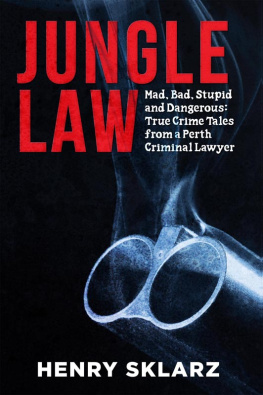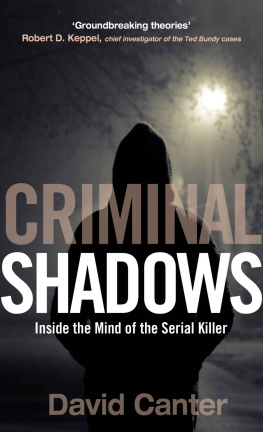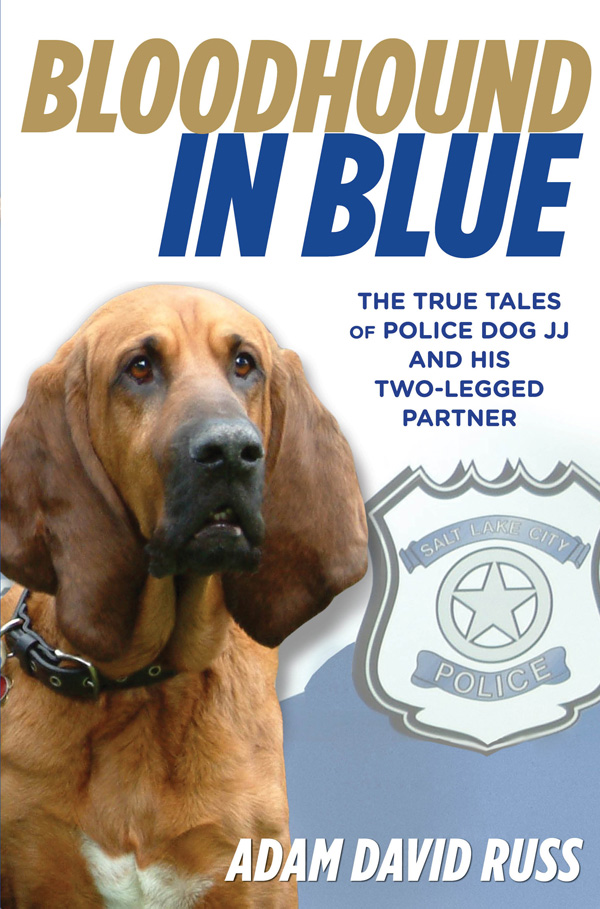
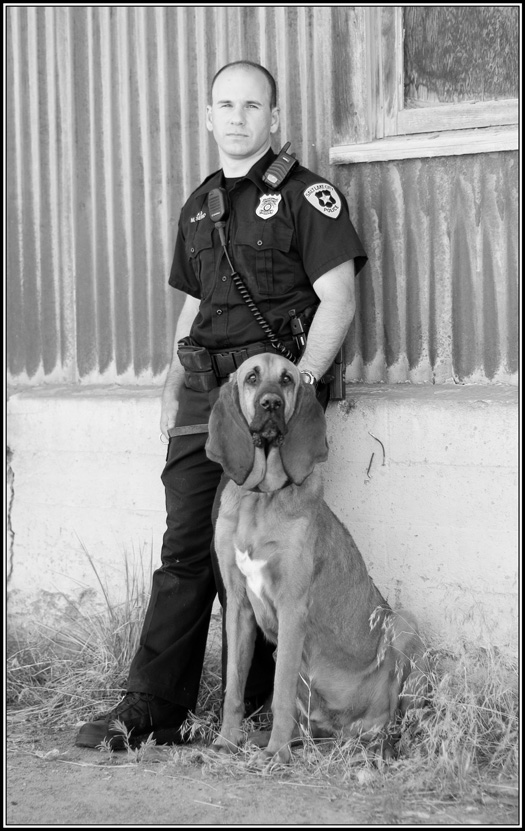
JJ and Officer Serio
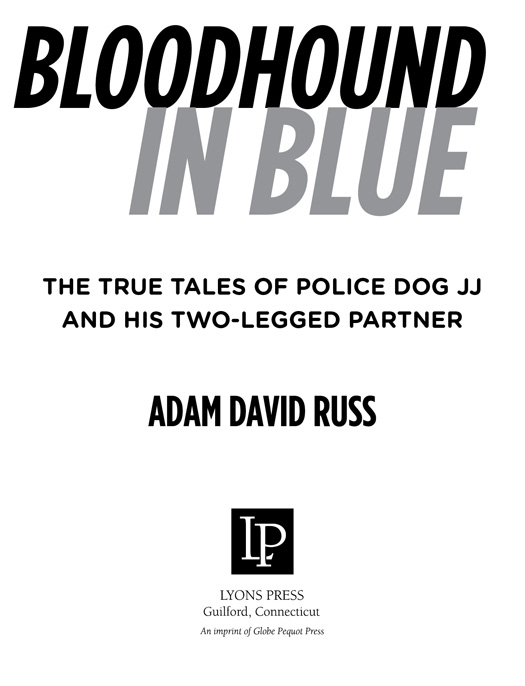
Copyright 2013 by Adam David Russ
All rights reserved. No part of this book may be reproduced or transmitted in any form by any means, electronic or mechanical, including photocopying and recording, or by any information storage and retrieval system, except as may be expressly permitted in writing from the publisher. Requests for permission should be addressed to Globe Pequot Press, Attn: Rights and Permissions Department, PO Box 480, Guilford CT 06437.
Lyons Press is an imprint of Globe Pequot Press.
Text design: Maggie Peterson
Layout: Melissa Evarts
Project editors: Ellen Urban and Lauren Brancato
Frontispiece photo courtesy of Salt Lake City Police Department
Library of Congress Cataloging-in-Publication Data
Russ, Adam David.
Bloodhound in blue : the true tales of police dog JJ and his two-legged partner / Adam David Russ.
pages cm
Includes bibliographical references and index.
ISBN 978-0-7627-9652-6
1. Police dogs. I. Title.
HV8025.R8697 2013
363.28dc23
2013014994
For Kadee,
and with love to Atticus
And though the villain scape a while, he feels Slow vengeance, like a bloodhound, at his heels.
Jonathan Swift
Ive already had medical attention.
A dog licked me when I was on the ground.
Neil Simon
CONTENTS
AUTHORS NOTE
This book is a work of nonfiction. The stories are real and backed by police case records, news reports, and firsthand accounts of many of those involved. The dialogue in the book comes from individuals speaking, draws upon their best memory, or was quoted in news sources and reports. The name of any crime victim not already known to the public has been changed. All other names are real.
The Bloodhound Breed Standards appearing at the start of each chapter are attributed to Dr. Sidney Turner and Mr. Edwin Brough in Points and Characteristics of the Bloodhound or Sleuth-hound . Published in 1894, the descriptions are still used today in evaluating bloodhounds by both the Kennel Club of the United Kingdom and the American Kennel Club.

INTRODUCTION
PEDIGREE
Like Mark Twain, Jessie Jr. was born in a small town in rural Missouri. Other than a prominent nose and perhaps a shared affinity for porterhouse steak, the similarities end there. His mother and father were nothing if not prolific and gave him nine siblings to fight and play with when he was first learning the ways of the world. Although they came so close together no one remembers his exact place in the birth order, it was clear early on that Jessie Jr. was different from the rest.
Mozart is said to have played the clavier flawlessly by age four and began composing music at the age of five. John von Neumann, the renowned mathematician and principal contributor to the Manhattan Projects development of the atomic bomb, was deemed a mental calculator at age six who liked to tell jokes in Ancient Greek. While rare by definition, prodigies are most common in the arts and sciences. In this Jessie Jr. set himself further apart. His field of expertise was law enforcement. He caught his first criminalan intoxicated hit-and-run suspectat age two. By his sixth birthday he had successfully tracked down missing children, drug dealers, burglars, thieves, kidnappers, armed robbers, batterers, rapists, child molesters, and murderers, including Utahs most wanted criminalall on his way to becoming one of the top police dogs in the country.
Known by family and friends as JJ, by law enforcement personnel throughout the West as Officer Serios canine partner, and by captured criminals as that damned dog, Jessie Jr., an exceptionally talented bloodhound, loved his job. His distinctive voice, a deep, reverberating bay sounding like a sea lion that had swallowed a foghorn, let everyone in earshot know that JJ had found the track and was on his way.
More than a prodigy, JJ was a pioneer. Although a small minority of police departments, primarily in the South and East, have used bloodhounds, the breed rarely had been deployed as police dogs in the West and never in Utah. The prevailing opinion held by Utahs police K9 handlers, who work with the fearsomely efficient German and Belgian shepherds, was that bloodhounds were floppy-eared dogs that dont bite. Not biting, it was believed, rendered them useless for police work. To be fair, at least some of the blame for the officers negative opinion of a bloodhounds capabilities can, as with many of todays misconceptions and head-scratching platitudes, fall on country music.
George Jones started the lie. Kenny Rogers picked it up a few years later, and then, in a move that some say launched his career, Blake Sheltonnow known for such hits as I Drink, The More I Drink, and Kiss My Country Asssang the lie all the way up to number fourteen on Billboards chart of Hot Country Songs. The song containing the lie in question is Ol Red. It tells the tale of a hound dog owned by the warden at a prison farm in Georgia that tracks down anyone foolish enough to try to escape.
Granted the song is a fiction created by songwriters Bo Bohan, Don Goodman, and Mark Sherrill, yet it contains elements that our culture has assimilated as truth. It doesnt help that many bloodhound handlers, with aspirations of helping the police, make the same mythical claims of their dogs smelling multiple-day-old trails. Even our pals across the pond believe the fantasy. The Times of London, reporting on two bloodhounds joining a UK police forcethe first such police dogs in the kingdom in over sixty yearsstated that the dogs will be able to pick up a trail that is several days old and follow it for up to 24 hours.
Unsolved crimes, particularly sensational ones involving children, bring out of the woodwork armchair criminal profilers, psychics of every hue, and concerned citizens calling in false leads on creepy neighbors. Into the fray come bloodhound handlers claiming that their dogs could find Jimmy Hoffa if you just let them sniff the old teamsters shoe.
Time and again police officers have seen bold claims of a bloodhounds skills come to nothing. Under such intense public scrutiny, its understandable that they refuse to integrate the overhyped floppy-eared dogs into their law enforcement teams. For JJ resistance took the form of doubt, ridicule, distrust, and jealousy. When he finally won over naysayers years later, JJ and his handler ran into something much worse: the crushing despair of failure amid high hopes.
As with many child stars, unrealistic expectations eventually derail a rapid rise to lasting glory. However, unlike a young star whose talent fails to hold, the consequences of JJs coming up short had higher stakes, notably in the lost track of Brian David Mitchell, the man who abducted fourteen-year-old Elizabeth Smart from her Salt Lake City home, raped her, and held her captive for nine months. After she was found and reunited with her family, the FBI and SLCPD investigators interviewed Elizabeth about the day of the kidnapping. While she was being taken on foot to a remote camp in the mountains, Elizabeth says she heard a dog baying in the woods behind her. JJ was pulled off the track for several reasons, all of them rationally sound but tragically wrong.


